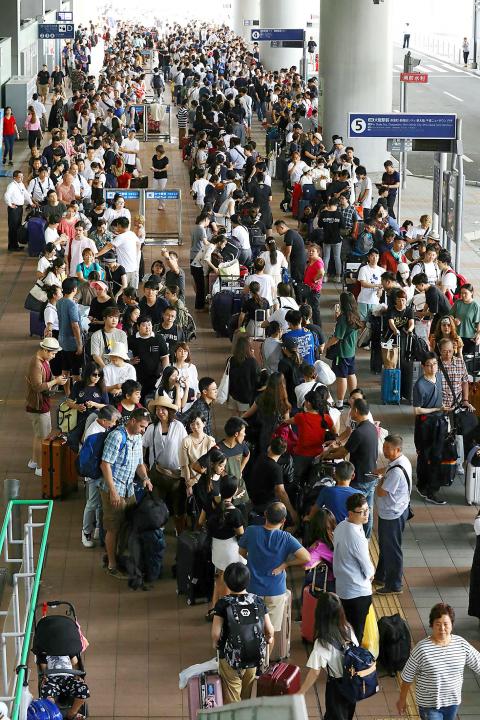More than 400 Taiwanese were stranded in Japan yesterday after Kansai International Airport shut down due to damage caused by Typhoon Jebi, the Tourism Bureau said.
The bureau said it has received reports from Lion Travel (雄獅旅遊), Cola Tour (可樂旅遊), Hi Hong Travel (喜鴻假期), Life Tour (五福旅遊), SET Tour (東南旅遊), and Richmond International Travel and Tour Co (山富國際).
As of 4:30pm yesterday, 458 tourists who used the agencies’ services were stranded in the Kansai area, the bureau said, adding that the agencies reported that 907 people have canceled their trips to Japan.

Photo: AFP
“We have asked the travel agencies to provide food and accommodation for the [stranded] travelers. They should also ensure the safety of the tourists under their care and keep us posted,” the bureau said.
Jebi flooded the runways at the airport with seawater, while a bridge to the airport was closed after a tanker carried by strong winds slammed into it.
As of press time last night, Tigerair Taiwan (台灣虎航), EVA Airways (長榮航空) and Peach Aviation (樂桃航空) had canceled today’s flights between Taiwan and Osaka.
China Airlines (華航) has canceled all flights between Taiwan and Osaka until Tuesday next week, while Cathay Pacific Airways (國泰航空) has canceled flights between Taipei and Osaka until Monday next week.
EVA is today to send a Boeing 777-300ER aircraft to Narita Airport in Tokyo to bring stranded tourists home.
China Airlines said it would use Airbus 330 aircraft for flights between Taiwan Taoyuan International Airport and Tamakatsu Airport on Shikoku Island in Kagawa.
It said it would also use Boeing 747 aircraft instead of Boeing 738 aircraft for flights between Taoyuan and Nagoya Airport in Japan.

SECURITY: As China is ‘reshaping’ Hong Kong’s population, Taiwan must raise the eligibility threshold for applications from Hong Kongers, Chiu Chui-cheng said When Hong Kong and Macau citizens apply for residency in Taiwan, it would be under a new category that includes a “national security observation period,” Mainland Affairs Council (MAC) Minister Chiu Chui-cheng (邱垂正) said yesterday. President William Lai (賴清德) on March 13 announced 17 strategies to counter China’s aggression toward Taiwan, including incorporating national security considerations into the review process for residency applications from Hong Kong and Macau citizens. The situation in Hong Kong is constantly changing, Chiu said to media yesterday on the sidelines of the Taipei Technology Run hosted by the Taipei Neihu Technology Park Development Association. With

CARROT AND STICK: While unrelenting in its military threats, China attracted nearly 40,000 Taiwanese to over 400 business events last year Nearly 40,000 Taiwanese last year joined industry events in China, such as conferences and trade fairs, supported by the Chinese government, a study showed yesterday, as Beijing ramps up a charm offensive toward Taipei alongside military pressure. China has long taken a carrot-and-stick approach to Taiwan, threatening it with the prospect of military action while reaching out to those it believes are amenable to Beijing’s point of view. Taiwanese security officials are wary of what they see as Beijing’s influence campaigns to sway public opinion after Taipei and Beijing gradually resumed travel links halted by the COVID-19 pandemic, but the scale of

TRADE: A mandatory declaration of origin for manufactured goods bound for the US is to take effect on May 7 to block China from exploiting Taiwan’s trade channels All products manufactured in Taiwan and exported to the US must include a signed declaration of origin starting on May 7, the Bureau of Foreign Trade announced yesterday. US President Donald Trump on April 2 imposed a 32 percent tariff on imports from Taiwan, but one week later announced a 90-day pause on its implementation. However, a universal 10 percent tariff was immediately applied to most imports from around the world. On April 12, the Trump administration further exempted computers, smartphones and semiconductors from the new tariffs. In response, President William Lai’s (賴清德) administration has introduced a series of countermeasures to support affected

Pope Francis is be laid to rest on Saturday after lying in state for three days in St Peter’s Basilica, where the faithful are expected to flock to pay their respects to history’s first Latin American pontiff. The cardinals met yesterday in the Vatican’s synod hall to chart the next steps before a conclave begins to choose Francis’ successor, as condolences poured in from around the world. According to current norms, the conclave must begin between May 5 and 10. The cardinals set the funeral for Saturday at 10am in St Peter’s Square, to be celebrated by the dean of the College